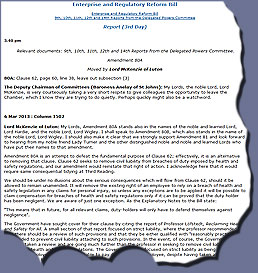Last Wednesday night the Lords narrowly voted against the Government’s attempts to remove Statutory Liability from all Health and Safety Offences. The vote was 225 against with 223 for.
As previously reported by Unionsafety, (Workers Death And Injury Compensation Attacked In New Tory Bill) this action has been sneakily embedded into a Bill, the Enterprise and Regulatory Reform Bill which in general has nothing to do with health and safety and is a common action of this government in trying to get a whole range of measures through Parliament via Bills which do not relate to the issues concerned.
Given the attitude of the Government to other defeats by the Lords, and especially considering that this defeat was by only two votes, it is probable that the clause will not be removed from the Enterprise Bill and will become law once the bill is passed.
In the debate, Lord McKenzie of Luton moved an amendment to clause 62 which removes the strict liability upon employers for the Health, Safety and Welfare of their employees.
In moving the amendment he said:
“We should be under no illusions about the serious consequences which will flow from Clause 62, should it be allowed to remain unamended. It will remove the existing right of an employee to rely on a breach of health and safety legislation in any claims for personal injury, so unless any exceptions are to be applied it will be possible to claim compensation for breaches of health and safety regulations only if it can be proved that the duty holder has been negligent. We are aware of just one exception. As the Explanatory Notes to the Bill state:
"This means that in future, for all relevant claims, duty-holders will only have to defend themselves against negligence".
 The Government have sought cover for their clause by citing the report of Professor Löfstedt, Reclaiming Health and Safety for All. A small section of that report focused on strict liability, where the professor recommended that there should be a review of such provisions and that they be either qualified with "reasonably practicable" or amended to prevent civil liability attaching to such provisions. In the event, of course, the Government have not undertaken a review and are going much further than the professor in seeking to remove civil liability from all breaches of health and safety regulations. The Government have focused on strict liability as being unfair because an employer could be found liable to pay damages to an employee, despite having taken all reasonable steps to protect them.
The Government have sought cover for their clause by citing the report of Professor Löfstedt, Reclaiming Health and Safety for All. A small section of that report focused on strict liability, where the professor recommended that there should be a review of such provisions and that they be either qualified with "reasonably practicable" or amended to prevent civil liability attaching to such provisions. In the event, of course, the Government have not undertaken a review and are going much further than the professor in seeking to remove civil liability from all breaches of health and safety regulations. The Government have focused on strict liability as being unfair because an employer could be found liable to pay damages to an employee, despite having taken all reasonable steps to protect them.
However, that does not give fair recognition to the fact that strict liability applies in very limited circumstances and where injured employees would otherwise face a near impossible evidential burden. Overwhelmingly, the duties are qualified by the phrase, "so far as is reasonably practicable". Examples of strict liability would include injury caused by defective equipment where the employer controls the selection, purchase, installation and maintenance of equipment, where investigation can be very difficult and with the employer holding all the cards.
The commentary in the Government's own impact assessment is that the number of compensation cases which rely on a breach of strict liability statutory duties will be small and despite their position, the Government have declined to undertake the review that Professor Löfstedt recommended to potentially restrict the number of situations in which strict liability is relevant. They now argue that it would be too complex a task and would anyway have largely been done when consideration of the transposition of EU directives was considered. Rather than doing the work, they use the issue as an excuse to change the liability regime across the board, potentially to the disadvantage of tens of thousands of employees each year, who will find access to justice more difficult and expensive. For some, it will be denied altogether.
Amendment 80B requires the appointment of an independent panel to carry out a review of health and safety duties to determine whether they should be actionable-a review requested by Professor Löfstedt. It requires this review to be completed within one year with a report to Parliament and with Clause 62 not brought into effect until this has been completed with the conclusions of the review reported to Parliament. It is the very least we should contemplate if the fundamental damage of the clause cannot be eliminated.
These issues are not just about legal nuances. Removing civil liability and leaving just one route via negligence represents a fundamental change in the position of duty holders and employees. It turns on its head a position which has pertained since 1898 and is a matter on which there has been broad political consensus during that time.
Other noble Lords more versed in the practicalities of the law will perhaps speak about why having to prove negligence will provide a more difficult route to getting redress. The issues are around the burden of proof shifting to employees, or indeed the family in the case of a fatality at work; requirements for more evidence gathering and investigation; and the incurring of greater costs. For employers this will not be a removal of regulatory burdens.
 What is the justification for making it harder-in some cases impossible-for employees injured at work to claim compensation? Where is the evidence that unreasonable claims are being made and settled? Noble Lords will be aware that claims for compensation relating to employer liability have to be registered with the Compensation Recovery Unit. This shows that the number of successful claims has declined year on year over the past three years. The Government seek to pray in aid the perception of a compensation culture and anecdotal evidence that the threat of being sued is putting employers off recruiting. Surely the task is to focus on the reality and not to pander to myths and perceptions. In any event, anecdotal perceptions are no basis on which to change fundamental rights that have been settled for more than a century.
What is the justification for making it harder-in some cases impossible-for employees injured at work to claim compensation? Where is the evidence that unreasonable claims are being made and settled? Noble Lords will be aware that claims for compensation relating to employer liability have to be registered with the Compensation Recovery Unit. This shows that the number of successful claims has declined year on year over the past three years. The Government seek to pray in aid the perception of a compensation culture and anecdotal evidence that the threat of being sued is putting employers off recruiting. Surely the task is to focus on the reality and not to pander to myths and perceptions. In any event, anecdotal perceptions are no basis on which to change fundamental rights that have been settled for more than a century.
The Government are proposing to do all of this without consultation and, by their own admission, without consultation or reference to the EU. The Minister is aware from legal opinion that has been copied to him that the Government's approach is potentially subject to challenge on a number of grounds-in particular, it fails to provide remedies sufficient to ensure effective legal protections in the fields covered by EU health and safety law.
We should be proud of the health and safety system that we have in the UK but, however good it is, we know that there are still deaths and accidents at work and that many still die each year by diseases caused by prior working conditions. Compensation for them, or for their families, is not some bonus or reward.
On the basis of the flimsiest of evidence, the opportunities for those injured at work to obtain redress are being substantially impaired. We should be very clear about that. This is not "business as usual". The beneficiaries, of course, will be the providers of employer's liability insurance. The losers will include taxpayers because reduced compensation will mean reduced benefit recovery. Indeed, all of those many good employers who take their health and safety responsibility seriously could see their position undercut by those who will take advantage of what they see as an erosion of our health and safety culture. Tens of thousands of individuals who have worked to support themselves and their families will have their quality of life made worse.
This clause cannot be allowed to stand as it is. I beg to move.”
All such opposition to Clause 62 is totally correct in the severe consequences the changes in the Enterprise and Regulatory Reform Bill will have for working people who are injured and the families of those killed at work.
Justice will be so hard to get that it will practically benefit employers to ignore health and safety regulations, safe in the knowledge that they are even more unlikely than now to be taken to court by individuals or their relatives.
You can read the full debate according to Hansard by clicking on the pic above.
See also: Workers Death And Injury Compensation Attacked In New Tory Bill
Source: Hansard / Steve Mann, CWU / Unionsafety


 The Government have sought cover for their clause by citing the report of Professor Löfstedt, Reclaiming Health and Safety for All. A small section of that report focused on strict liability, where the professor recommended that there should be a review of such provisions and that they be either qualified with "reasonably practicable" or amended to prevent civil liability attaching to such provisions. In the event, of course, the Government have not undertaken a review and are going much further than the professor in seeking to remove civil liability from all breaches of health and safety regulations. The Government have focused on strict liability as being unfair because an employer could be found liable to pay damages to an employee, despite having taken all reasonable steps to protect them.
The Government have sought cover for their clause by citing the report of Professor Löfstedt, Reclaiming Health and Safety for All. A small section of that report focused on strict liability, where the professor recommended that there should be a review of such provisions and that they be either qualified with "reasonably practicable" or amended to prevent civil liability attaching to such provisions. In the event, of course, the Government have not undertaken a review and are going much further than the professor in seeking to remove civil liability from all breaches of health and safety regulations. The Government have focused on strict liability as being unfair because an employer could be found liable to pay damages to an employee, despite having taken all reasonable steps to protect them. 